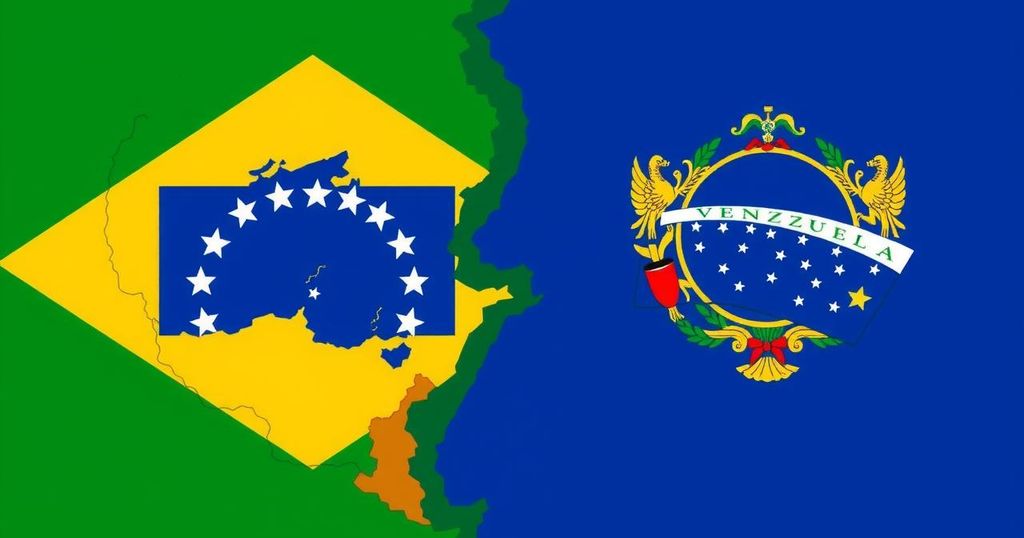On October 24, Venezuela condemned Brazil’s veto of its BRICS membership application, calling it a “hostile gesture” and a continuation of previous sanctions policies. The Venezuelan Foreign Ministry criticized Brazil for perpetuating exclusionary practices, reaffirming support for Nicolás Maduro amidst contested election results. Brazil remains resistant due to concerns over the legitimacy of Maduro’s government. The BRICS summit concluded with 13 new member countries invited, notably excluding Venezuela.
On October 24, the Venezuelan government expressed strong disapproval towards Brazil’s rejection of its application to join BRICS, labeling the decision a “hostile gesture”. This condemnation was articulated through an official statement issued by the Venezuelan Foreign Ministry, which characterized Brazil’s action as an extension of a broader “criminal policy of sanctions” against Venezuela. This statement emerged in the wake of the BRICS summit held in Kazan, Russia from October 22-24. The Venezuelan Foreign Ministry noted that Brazil’s diplomatic mission, led by Eduardo Paes Saboia, continued a longstanding veto that had been maintained by former President Jair Bolsonaro. It asserted that such a decision perpetuates the prevailing sentiments of “hatred, exclusion, and intolerance” directed toward Venezuelans over the past decade, as influenced by major global powers. “The Venezuelan people feel indignation and shame at this inexplicable and immoral aggression by Itamaraty, maintaining the worst of Jair Bolsonaro’s policies against the Bolivarian Revolution founded by Commander Hugo Chávez,” the Venezuelan statement conveyed. In addition, Venezuela expressed gratitude to Russian President Vladimir Putin for the invitation to participate in the Kazan summit, asserting that “no maneuver or trick will stop the course of history.” Venezuelan President Nicolás Maduro formally submitted his request to join BRICS in May 2024. Diplomatic sources indicated that Brazil had been reluctant to support Venezuela’s entry amid pre-summit negotiations. Ultimately, 13 nations were invited to join as partner states, but Venezuela was notably excluded. During the summit, Brazil’s Foreign Minister Mauro Vieira revealed that leading BRICS nations reached a consensus on the criteria for future expansion, which confirmed a collective agreement regarding the principles guiding this growth. Moreover, President Vladimir Putin highlighted the rift between Brazil and Russia over Venezuela’s membership, noting Russia’s recognition of Nicolás Maduro’s legitimacy following the controversial presidential elections in Venezuela. Brazil’s veto stems from its stance of not publicly endorsing the election results from Venezuela, which declared Maduro the victor on July 28. The far-right opposition refutes the outcomes, claiming to have data that suggests otherwise, although they have yet to present this evidence to Venezuelan courts. In recent months, President Lula has commented on the Venezuelan electoral situation, emphasizing a lack of reliable results from both the government and the opposition, and has called for the National Electoral Council to publish thorough results, even proposing the consideration of new elections.
The recent tensions between Venezuela and Brazil have surfaced during a crucial juncture following the BRICS summit in Kazan. Venezuela’s aspiration to join BRICS underscores its desire for enhanced global partnerships amidst ongoing economic sanctions. The refusal by Brazil to embrace Venezuela’s entry reflects deeper political divisions, particularly concerning the legitimacy of Venezuela’s electoral processes. Since the election that declared Nicolás Maduro the winner has been contested by the opposition, Brazil’s hesitation is symptomatic of its broader foreign policy priorities and regional diplomatic dynamics. The sentiments expressed by Brazilian officials, including Brazil’s Foreign Minister, indicate a cautious approach to the organization’s expansion, emphasizing consensus among member nations.
In summary, Brazil’s veto of Venezuela’s BRICS membership has incited significant criticism from the Venezuelan government, which perceives the decision as a continuation of hostile policies reminiscent of past administrations. The underlying dispute reflects not only the complexities of bilateral relations but also the intricate web of regional politics and electoral legitimacy. The exclusion of Venezuela from the BRICS expansion illustrates the challenges facing nations engaged in geopolitical negotiations, particularly in contexts marked by significant dissent and differing political ideologies. This situation reinforces the need for transparent dialogue and mutual understanding among nations in the pursuit of cooperative international relationships.
Original Source: www.brasildefato.com.br






